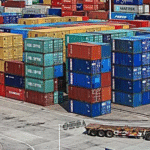•Government cargoes, port investments to decline
By Steve Agbota
Nigeria could forfeit as much as N1.6 trillion annually as the United States and Russia intensify plans to position Togo as West Africa’s next maritime hub, a move analysts warn could trigger a sharp decline in government cargo volumes and port investments.
Significant volumes of cargo bound for Nigeria have long been diverted to the ports of Lomé in Togo, Cotonou in Benin Republic and Tema in Ghana, largely due to the prohibitive cost of doing business at Nigerian ports.
In recent times, thousands of Nigerian importers have also increasingly bypassed local ports altogether, opting instead for neighbouring countries where duties and taxes are comparatively lower.
Over the years, the increase in the volume of trade between Asia and West Africa has seen Lomé Port transform into a key regional container port, as a major boost for liner connectivity of West African ports, including Lomé. Given these trade advantages, the U.S. has pledged to expand its African market access through Lomé Port. Last week, the U.S. Embassy in Lomé, led by the Chargé d’Affaires, Richard C. Michaels, conducted a tour of the port facility. Stakeholders who spoke with Daily Sun said that it is a bad omen for the two powerhouses to seek access in the port of Togo over Nigeria.
The Head of Research of the Sea Empowerment and Research Centre (SEREC), Eugene Nweke, said not long ago, Nigeria stood tall as the logistics gateway to West Africa, saying today, global giants like the U.S. and Russia are diverting shipments to Lomé, Togo, bypassing Nigerian ports entirely.
He said combining the potential loss of investment and decreased government revenue, Nigeria could face a total loss of around N800 billion to N1.6 trillion.
He said: “We must ask what went wrong and what we must do to reclaim our position.”
He said Nigeria losing its logistics hub status can have significant economic implications for Nigeria, including reduced revenue, decreased economic activity, and potential job losses.
According to him, Nigeria’s decline in logistics competitiveness can make it less attractive to investors, shippers, and businesses, ultimately affecting its economic growth and development.
He said Nigeria faltered in endless port congestion and delays in Apapa and Tin Can.
He said some of the factors working against Nigeria also include multiple government agencies working at cross-purposes, no national logistics strategy or dedicated logistics zones. He said rising insecurity on transport corridors, weak infrastructure links, and the high cost of doing business discourage shippers and investors.
Meanwhile, he added that Togo has positioned itself strategically with digitised port operations, efficient Customs, and a seamless connection to regional trade corridors.
However, he said all is not lost for Nigeria and it can bounce back by fully digitising its ports and embracing single-window trade platforms.
He said there is a need to implement a National Logistics Policy backed by infrastructure reform, operationalise and market the Lekki Deep Sea Port strategically.
He said Nigeria needs to invest in rail-port connectivity, secure dry ports across the hinterland, and create special logistics zones with clear incentives and one-stop governance.
“The truth is that logistics is no longer just a support function. It is a strategic tool for economic competitiveness, and Nigeria cannot afford to be left behind. Let’s move from rhetoric to reform. From congestion to connection. From potential to performance. Nigeria must reclaim its place as the undisputed logistics hub of West Africa. It is not just possible, it is necessary,” he said.
The Chief Executive Officer of Centre for the Promotion of Private Enterprise (CPPE), Dr. Muda Yusuf, said that the implication is something negative for the economy and the maritime sector.
“In the maritime sector, we have several stakeholders here. We have the terminal operators, shipping companies, dock workers. We have all manner of people who are making a living from the maritime sector and we have people who have invested by the terminal operators. So if the cargo traffic begins to diminish or to reduce, it will have a very serious negative effect on this investment. It will affect revenue. It will have effects on maritime sector jobs. So it’s not a good thing at all that is happening.
According to him, if these countries are taking that decision, one can imagine the number of businesses or importers that would have taken that option.
“That is what we call diversion of cargo to neighbouring countries. So it’s not a good thing. I think if there are issues in our ports, there have been a lot of complaints over the years. I think we need to fix it, and most of these issues are really human issues, which I think we should do something very urgently about.
“It is not good for the economy at all. It’s also not good even for our perception as a country because if we are talking about ease of doing business, the ease of cargo clearing, the cost of cargo clearing is a major part of the ease of doing business conversation. So I think we need to respond to this situation by orderly fixing whatever problems are there in the ports to make our ports a lot more investment-friendly,” he said.
An importer, Fred Chukwuma, said Nigeria would lose billions of naira because the majority of project cargoes come from the U.S. and Russia.
“The financial implication is that we lose project cargoes to Togo and there will be more cargo diversion to neighbouring ports. Nigerian ports are not well structured and positioned like the ports of Lomé and Tema. The high cost of doing business and various taxes are driving importers and investors away from Nigerian ports.
“We have written on several occasions to the government and given them ideas on how to improve our port operations, but nobody listens to us. The government is just introducing charges here and there. This is why most people are running from our port. Even our port is not efficient compared to our neighbours. So I’m not surprised if the U.S. and Russia ditched us for Togo,” he lamented.
He said 80 per cent of cargoes imported to these neighbouring ports are destined for Nigeria and that is where the government is getting it wrong.


















Leave a comment